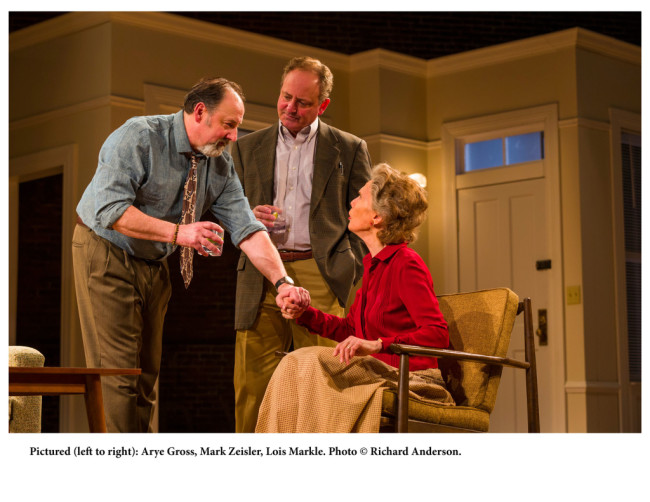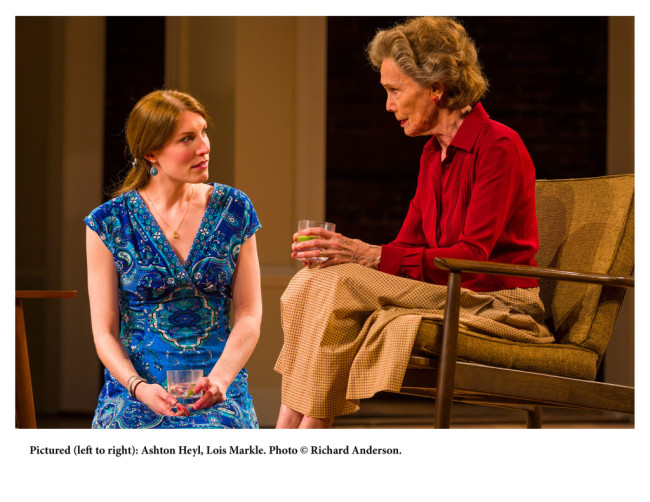You can’t fight for change and be nice. But how will you feel at the end of your days when you look back to see how your time was spent? Will you be proud, or will the blanket coverall statement of “we did what we had to do” come to mind? An evocative, albeit esoterically focused, drama kicks off The Herzog festival at Centerstage this spring. After the Revolution, written by Amy Herzog and Directed by Lila Neugebauer, follows the aftermath of a political advocate on the rise whose world is upended when she learns that her family history isn’t as she’s always believed it to be. Despite the myopic focus of Communism and Red Scares, the message that Herzog infuses into the familial drama is universal; evaluating your morals and where you stand when the game changes because of them.
Ste Designer Daniel Zimmerman fabricates a rather plain interior design that serves as multiple indoor location, primarily the households of various members of the Joseph family. While at first Zimmerman’s design work does not seem overly impressive, though it is a very polished, it’s Lighting Designer Eric Southern who imbues the liveliness of the atmosphere into Zimmerman’s structural work. The warm projections of subtle ambers, yellows, and oranges mute the harsh whiteness of the room and give it a natural lived-in feel. Zimmerman does craft a classy sense of latent aristocracy into the set with higher walls and featured molding. Though the overhang on the ceiling smacks of a superfluous need to encapsulate the action of the play; capping it with a roof as if to remind the audience that they’re inside a house, inside a drama, and inside a play.
Playwright Amy Herzog’s work is not uninventive, but the narrative is stifled. There is a solid message worked into the dialogue, even if it takes a roundabout way to reveal itself. The action settles in places that keeps the play from moving forward at a decent pace, despite Director Lila Neugebauer’s intense efforts to drive the pacing. What keeps the show interesting, aside from the varying characters that cross the story as it progresses, is Sound Designer Brandon Wolcott. Composing original music for the show, and working in tandem with Zimmerman to create atmospheric pulses of energy that jumpstart various scenes, Wolcott captures the attention of the audience with his emotional infusions of sound. It is difficult to eloquate the beauty of Wolcott’s orchestrations, suffice it to say that they fit sublimely with and serve as an informant for the political, emotional, and familial events that happen in each scene.
Neugebauer may not have success in keeping the action happening in Herzog’s work, a fault that falls largely upon the writing, but her approach to the general relatability and organic existence of the characters and their relationships is spot on. There are tightly conducted scenes, like the silently received phone call between Emma (Ashton Heyl) and her father Ben (Arye Gross) that are truly striking. The force of emotions gushing forward from Gross’ character to Heyl’s radio silence, juxtaposed being just feet apart on the stage physically is astonishing.
It’s minor cameo appearances by actors like Susan Rome and Peter Van Wagner that keep the audience’s interest when the general intrigue of the plot starts to wane. Rome, who plays Emma’s step mother, is the hint of bubbly that the play needs from time to time. Her heartfelt phone conversation with Emma’s character really grounds her in the play’s reality while still serving to brighten the bleak outlook that the play faces at that point in its timeline. Van Wagner functions almost like comic relief, his character’s persona and accent most fitting for his role in the action. It’s his congenial nature in conversations over lunch and dinner with Emma’s character that bring the essence of dedication and familial commitment into the show.
Miguel (Alejandro Rodriguez) fits into the play’s overall dynamic in an unusual fashion. It takes a while for Rodriguez’ character to have material with which he can really make his presence felt but as they dynamic in Miguel’s relationship with Emma shifts, Rodriguez comes into his own with a solidarity that defines his character. There is a striking tenacity about him in the “break scene” which makes up for the lack of emotional depth that Ashton Heyl fails to deliver throughout the performance.
Heyl’s delivery of the character is uneven and opposing the nature of the emotional energy of her character’s scenes. In larger more involved scenes, like when Ben and Emma come to a head near the end of the production, Heyl’s histrionics feel forced and unauthentic, as if the emotional turmoil building inside of her has not yet been earned. And in more muted moments of emotional silence, she doesn’t feel present. To her credit, when zingers work their way into the text— which in this production is few and far between— she delivers them with a fierce zap.
The two characters that draw the focus back to the message of the play are the stoic grandmother figure, Vera (Lois Markle) who is again of the “step-family” variety, and Emma’s sister Jess (Kelly McCrann.) Both women are bold personalities on the stage in complete varying opposites of one another. McCrann’s physical and emotional commitment to her ex-junkie character is the epitome of a recovering addict. Her speech patterns and ease of fluidity in scenes makes her the most natural performer on the stage. Markle delivers a strong performance as the reserved and revered matriarchal figure, standing her ground on principle and dignity. Both women carry the strength of the show’s meanings to fruition with their performances.
Ayre Gross delivers a mostly impressive performance as Ben, Emma’s father. Though at times the character’s aloofness seems out of place with the text and action of what’s happening in the moment, for the most part Gross is in tune with the character’s emotions and internal dialogue. His radical more explosive moments, like the emotional inferno that erupts from him during the silent phone conversation with Emma, are what really drives his side of the story and keeps his versatility as a performer vibrant.
The show is not without its merit, and does pose a great deal of thought provoking questions that are well worth considering.
Running Time: 2 hours and 10 minutes with one intermission
After the Revolution plays through May 17, 2015 in The Head Theatre in rotating rep as a part of The Herzog Festival at Centerstage— 700 N. Calvert Street in Baltimore, MD. For tickets call the box office at (410) 332-0033 or purchase them online.





